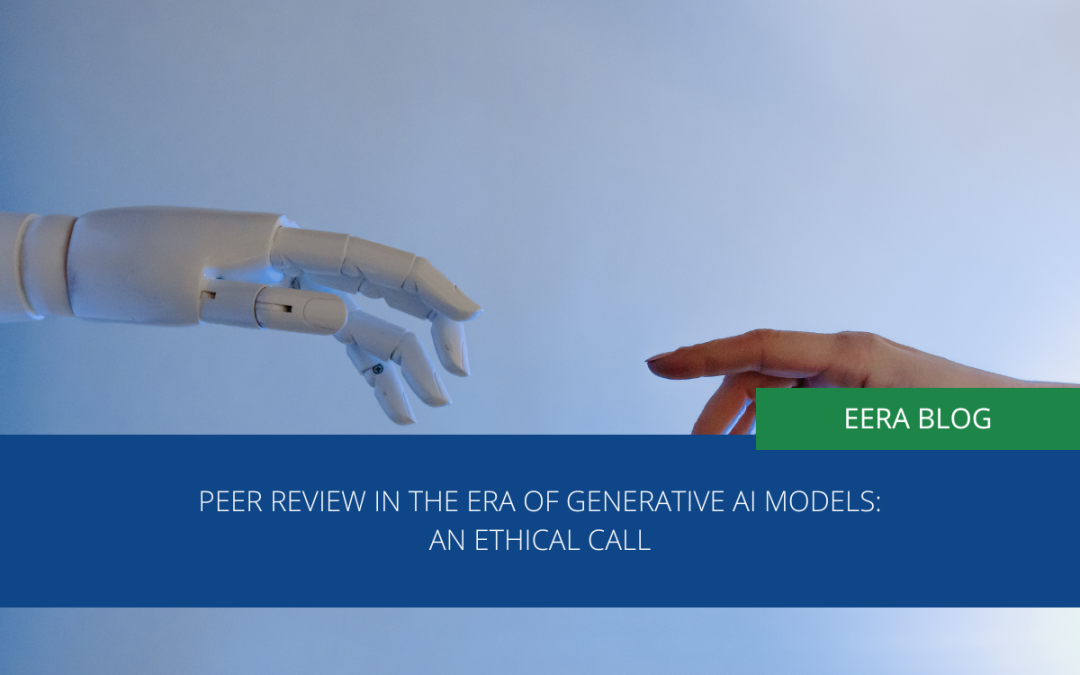The emergence of generative AI models, such as ChatGPT, is significantly impacting various facets of society, including research and academia. Given their ability to generate human-like text based on input data or prompts, generative AI models have profound implications for the academic community. These implications entail ethical and societal challenges within the peer review process, raising questions about the potential role of such models (Schintler, McNeely and Witte, 2023).
As a reviewer, I believe that it is my responsibility to highlight and discuss these critical and timely ethical concerns. Thus, while acknowledging the potential benefits of using such models for academic purposes, this blog post aims to highlight the caveats of using such models in peer-reviewing, and some of their potential pitfalls. This, in turn, emphasises the fundamental need for clearly shared and regularly updated ethical guidelines that ensure the healthy use of such models in academia.
Can generative AI assist or replace expert reviewers?
How much of AI is too much? This raises the ethical dilemma: should generative AI assist or replace expert reviewers? To address such fundamental questions, we should first acknowledge that AI, like any technology, is designed to increase the productivity of professionals, not necessarily replace them.
To begin with, generative AI (GAI) can assist reviewers, particularly those for whom English is not their first language, in producing clear and concise reports in less time. For instance, generative AI tools, such as editGPT, have the potential to save time in assessing text readability; tasks that are less intellectually demanding (Checco et al., 2021). I therefore believe it is acceptable for expert reviewers to use generative AI to streamline the review process, while emphasising the necessity of checking the report accuracy.
The pitfalls of AI in the peer review process
Generative AI models are typically unable to offer recommendations based on the latest research findings in the dynamic and complex field of education. The expertise of human peer reviewers is generally beyond the capabilities of generative AI models, which lack the required domain knowledge and intellectual capacity, at least in the foreseeable future. These limitations may have serious implications where GAI models typically provide general comments that lack critical content about the concerned manuscript (Donker, 2023); this means the lack of proper improvement recommendations with the possibility of the manuscript being unjustly dismissed.
Generative AI models may produce reviews that contain ethical concerns and biases. AI algorithms risk copying and/or possibly expanding human biases (Schintler, McNeely and Witte, 2023). An example of one ethical consideration, which even human reviewers may not fully adhere to, is the importance of respecting the authors’ perspective and not converting their manuscript into that of the reviewers. AI might make recommendations that do not really respect or consider the authors’ perspective enough. This could potentially result in humans being responsible not just to fellow humans but also to machines (Schintler, McNeely and Witte, 2023). Reviewers equally need to be aware of caveats such as breaching the confidentiality of the manuscript under review, as generative AI models may use or share the original ideas as part of their machine-learning processes (Mollaki, 2024). These ethical issues clearly highlight a call for the wise use of unfolding AI technology.
Effective GAI Implementation
We acknowledge that GAI technology is developing at a fast pace (Checco et al., 2021), so it is not easy to predict its exact capabilities. Accordingly, we might witness the emergence of generative AI models that address some of the above ethical concerns. Therefore, it is the collective responsibility of all involved in knowledge production (authors, reviewers, editors, academic supervisors) to continually review and update the scientific community, as well as society members in general, on best practices for using generative AI in academia.
Peer reviewers have an ethical duty to uphold their full responsibility and resist the temptation to simply delegate the job to generative AI models. While researchers importantly advocate for policies that govern the use of AI in peer review (Mollaki, 2024), I do believe that it is, first and foremost, an ethical responsibility that should be central to the review process, with clear repercussions for those disregarding these fundamental ethics.
Thus, this blog post, following Facer and Selwyn (2021), advocates for a ‘non-stupid’ optimism that acknowledges the limitations of using digital technologies in academia. This necessitates that the dialogue be positioned within continuous academic discussions and research on reliable and ethical AI-powered peer review. All those involved in advancing educational research need to ensure that ethics is at the heart of the knowledge production process; otherwise, the integrity of the entire process would be compromised.
Key Messages
- Generative AI models like ChatGPT have critical implications for academic peer review.
- Expert reviewers play a crucial role in maintaining the quality and integrity of the peer review process.
- Generative AI should complement, not replace, human judgment and expertise in academia.
- Continuous review and dialogue are necessary to ensure ethical and effective use of AI in peer review.

Dr Ayman Hefnawi
Mathematics Instructor, ADVETI, UAE
Ayman Hefnawi holds a Doctor of Education from the University of Bath, United Kingdom, and a master’s degree in educational leadership and management from the University of Warwick, United Kingdom. Additionally, Ayman serves as a reviewer for educational journals and maintains memberships in various academic associations
https://www.researchgate.net/profile/Ayman-Hefnawi
https://www.researchgate.net/profile/Ayman-Hefnaw
https://twitter.com/aymanhefnawi
https://orcid.org/my-orcid?orcid=0000-0002-7744-6997
https://www.scopus.com/authid/detail.uri?authorId=57315619100
Other blog posts on similar topics:
Checco, A., Bracciale, L., Loreti, P., Pinfield, S. and Bianchi, G., 2021. AI-assisted peer review. Humanities and Social Sciences Communications, 8(1), pp.1-11. https://www.nature.com/articles/s41599-020-00703-8
Donker, T., 2023. The dangers of using large language models for peer review. The Lancet Infectious Diseases, 23(7), p.781. https://www.thelancet.com/journals/laninf/article/PIIS1473-3099(23)00290-6/fulltext?rss=yes
Facer, K. and Selwyn, N., 2021. Digital technology and the futures of education: Towards ‘Non-Stupid’optimism. Futures of Education initiative, UNESCO.
Mollaki, V., 2024. Death of a reviewer or death of peer review integrity? The challenges of using AI tools in peer reviewing and the need to go beyond publishing policies. Research Ethics, p.17470161231224552. https://journals.sagepub.com/doi/10.1177/17470161231224552
Schintler, L.A., McNeely, C.L. and Witte, J., 2023. A Critical Examination of the Ethics of AI-Mediated Peer Review. arXiv preprint arXiv:2309.12356. https://arxiv.org/abs/2309.12356

